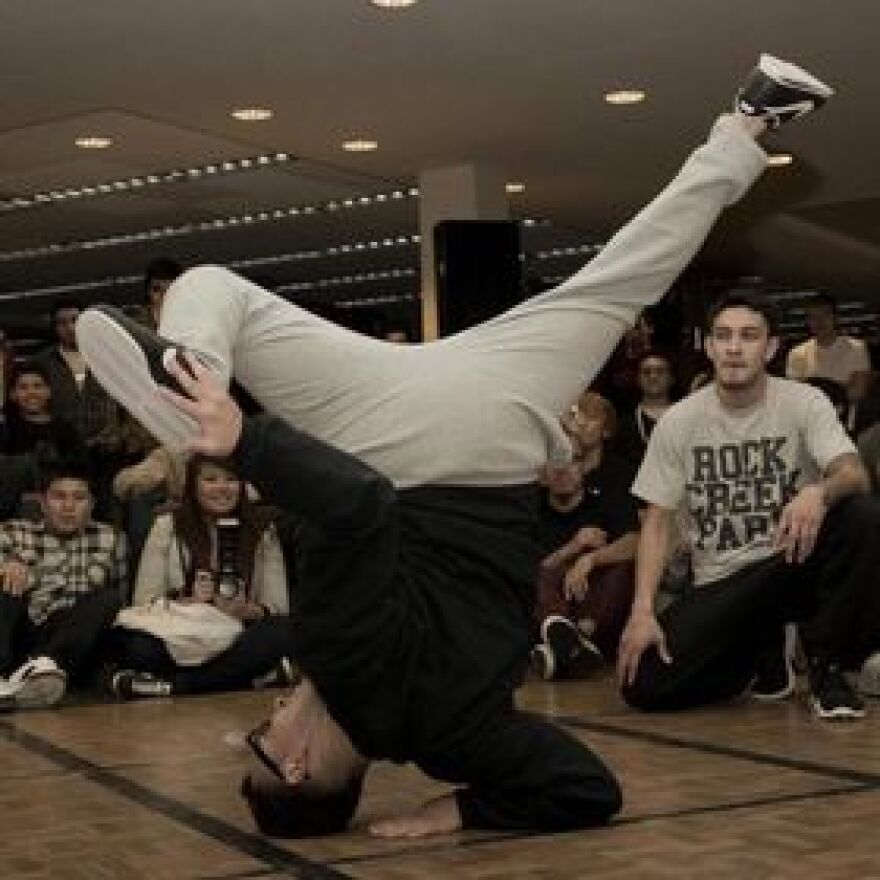Getting therapy doesn’t always mean you have to talk to someone. Some people use writing, reading or even exercise to heal. A Rockford artist is using a different method.
Victor Rivera, commonly known as “Vic Monsta,” started breakdancing around the age of 13. He said this kept him out of trouble and immersed him in a diverse pool of people. His parents loved how he interacted with other dancers, so they supported this. As he got older, he started DJ-ing and performing in dance competitions. He talked about the music that inspires him to move.
“We were listening to like James Brown, the Jimmy Castor Bunch. And like the Blackbyrds and Kool & The Gang, a lot of like funk stuff. And that's the real essence of breaking is like funk,” he said.
He had no idea that dance and music would become his therapy.
Rivera lost his mother a couple of years ago. He said she was in her late 50s when something suddenly changed.
“It started with her claiming she couldn't sleep. And she was very, like, arrogant about not sleeping,” he explained. “And my dad who's, I mean, he's a saint. He's such a wonderful man, you know, he was in bed with her every night. And he would say, ‘No, I saw you sleep.’”
She continued to claim she couldn’t sleep. Then one day, he said, she started to tell the family that she wanted them to be happy once she was gone. He said they didn’t think anything of that statement. Unfortunately, shortly after, she committed suicide.
Rivera said his mother was never diagnosed with any type of mental illness. She did see a doctor and was considered healthy. The family continued to reach out for help. Rivera said it’s hard to find mental health services that provide Spanish speaking individuals in his area.
Danielle Angileri is the executive director of the National Alliance on Mental Illness of Northern Illinois.
“So, we do have a lack of mental health providers for many nationalities really,” Angileri admitted. “But I just want people to know that mental health care is a medical field and people should be offered a translator if there is not a professional that speaks the language.”
Part of the problem, Rivera explained, is that getting support for mental health is considered taboo in the Latino culture.
“It just stems I think from a long time of just being proud families, you know, not wanting to have that, like, black sheep or something like that maybe,” he said. “But we, you know, we have never dealt with anything like that. But I know when we would hear stories of other families, it was just kind of being brushed under the rug.”
Furthermore, a 2019 Sage Journals article states that religious values play a great role in the stigma.
After Rivera’s mother passed, he remembered how freeing dance was for him.
Rivera admitted that when his mother died, he decided to do something that would increase mental health awareness in his community. Recently, he partnered with NAMI in his area. He took part in a Zoom session called “Alternative Therapies: Music & Dance.”
Angileri said the collaboration was important.
“And we kind of thought together to kind of give people another place to release, maybe what they were feeling if they have similar stories,” she said, “or maybe they're just dealing with the impact of mental illness in a different way.”
Angileri shared that every individual’s need is different. She suggests alternative therapy offers additional coping mechanisms, without people relying on traditional therapy and medication. And she said complimentary alternative therapy can even, possibly, reduce some side effects from different medications.

Jenny Vause is the artistic director and co-owner at Evolve Dance Company in Rockford. She explained that our body movements during dance are a continuation of the lyrics and the sound waves of the music. She said it’s the art, the movement, and the emotion behind it that drives dancers. She recalled a remark that one of her student’s parents made.
“She said, ‘I know dance is expensive, but I'd much rather pay for it than therapy,’ which I thought was interesting, because I think some kids have trouble getting out verbally how they're feeling,” she mentioned.
Vause said that she relied on this art form as a mental outlet while she was growing up and when her dad died 10 years ago.
“And man was dance there for me because I was able to really kind of tap in. And I've never really been a talker, kind of like that one mom was talking about, like, I know that my daughter is not a talker. So this is the way this is her therapy. Right? So it's the same thing, ” Vause explained.
Rivera said dealing with a mental health issue could happen to anyone -- he notes that he isn’t aware of any history of mental illness in his family. And he reminds people that they are not alone.
“There's very many people who have or are going through what you're going through," he expressed. "And they may not look the part.”
Rivera explained that talking to NAMI gave him some sort of relief. He plans to continue to work with them to provide a resource for the Latino community.
- Yvonne Boose is a 2020 corps member for Report for America, an initiative of the GroundTruth Project. It's a national service program that places talented journalists in local newsrooms like WNIJ. You can learn more about Report for America at wnij.org.



